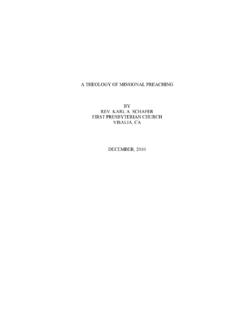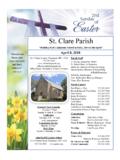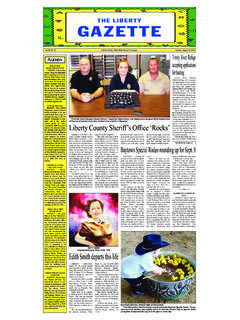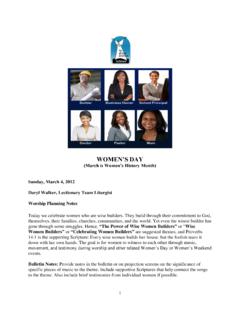Transcription of A Plan for Congregational and Pastoral Care Giving …
1 A plan for Congregational and Pastoral care Giving with our Senior and Elder Members Prepared for St. Mark's United Methodist church by Martha Lundgren updated April, 2016. For additional information about this plan , please contact Martha Lundgren at 520-834-6015. or Congregational and Pastoral care Giving with Senior Members Contents Ministry of care with Our Elder 3. Background .. 3. High-Level Ministry plan .. 4. Identifying Those Called to Launch 5. Education and Training .. 5. Congregational care 6. Ministry Structure .. 7. Budget .. 7. Next Steps.
2 8. Appendix A Curriculum .. 9. Version 2 of 13. Congregational and Pastoral care Giving with Senior Members Ministry of care with Our Elder Members The ministry presented here focuses on how we care for our elders and those at the end of life. It encourages continued ministry by older adults. The primary components of the ministry program are educational resources for members and developing lay people to serve in Congregational and Pastoral care . It may also serve as a model for expanding how we care for each other no matter our age or stage of life.
3 Ministry goals: St. Mark's members will experience aging in healthier and more meaningful ways. Ministry by older adults will be encouraged as natural expressions of their gifts and God's grace, as long as they desire to be active in carrying out God's call in their lives. The unique gifts, perspectives, and diversity among Baby Boomers will inform and enrich this ministry. Members and care givers will experience fewer and less intense crises as they get older. Intergenerational events and relationships will strengthen the bonds of Christian fellowship and are recognized as crucial for the health and well-being of people of all ages.
4 A cadre of trained volunteers will serve in Congregational and Pastoral care - Giving roles. The sacredness of end-of-life will be explored and embraced. The purpose of this document is to present a high level description of a ministry of care with our elder members. As we learn from our ministry together, the plan will be updated. First published in May, 2014, version is our first significant update. Background St. Mark's mission statement is: Changing the world through Christ, by caring for all people.. We do that through the work of our pastors, staff, and a broad range of ministry teams whose work touches people of all ages and stages.
5 Those include Congregational care , Worship, Adult Education and Adult and Family Ministry groups such as Open Doors and Handy Hands. Congregational care encompasses a wide range of ministries and teams, such as visitation with members who are homebound, hospitalized, and in rehabilitation or care facilities, prayer ministry, and hospitality associated with funerals and memorial services. Many needs are addressed by individuals and small groups outside our formal structures. Looking across our church , we are obviously and particularly called to care for our elders.
6 Like many communities, St. Mark's members face many challenges related to aging and care Giving . Individuals and families are frequently unprepared for the normal, important, and inevitable tasks and problems associated with aging. Individuals and families at all ages and stages experience the sacred end-of-life time. Too often, both of these natural phases of life are experienced as a series of worsening crises. These concerns are further complicated when family care givers and care receivers are separated by long distances. Version 3 of 13. Congregational and Pastoral care Giving with Senior Members At St.
7 Mark's, we recognize that our members' needs require intentionally increasing our capacity for Congregational care and Pastoral care . We strive to prevent what has, at times, approached and even hit crisis-level, resulting in exhausted pastors who carried a wide variety of ministerial and administrative responsibilities. With the first Baby Boomers turning 70 in 2016, the sheer number of folks experiencing Table 1 - Age of St. Mark's Members aging threatened to overwhelm our capacity for ministry. Solving for this by hiring more clergy and staff would be expensive.
8 It would also set artificial limits on how lay people might use their gifts and talents in Christian service. Instead we should develop a culture of ministry where we are the church includes lay people answering God's call to use their giftedness for Congregational and Pastoral care Giving . We will train lay people for service and put their time and talents for ministry to good use. The congregation will hold up during worship those who respond to their call. Baby Boomers bring special gifts and opportunities for ministry to our congregation and our community.
9 This unique generation's spiritual gifts and yearnings provide opportunity and capacity for inviting people to know Jesus. Baby Boomers, nor any other generation, cannot be treated as a monolithic entity. Our ministries must include understanding cultural sub groups. We understand that each person is a unique individual with whom building relationships and being in ministry together are precious events. As Methodists, we have a strong tradition of attending to the educational and health needs of our communities. We also have a strong tradition of equipping lay people for ministry.
10 We can honor and extend those traditions by education designed to reduce the number and severity of crises social, spiritual, and health that do not have to be inevitable consequences of aging. Especially with Baby Boomers, we have opportunities to bring fresh perspectives to ministry just as Baby Boomers have been the source of so many changes in society-at-large. Also, in our Methodist tradition, lay people ensure the continuity of relationships and service across years and decades. In the immediate and through the next twenty or thirty years, a strong system of education and lay service with Baby Boomers and with our current elders will be the means for the best care possible for the saints among us.



